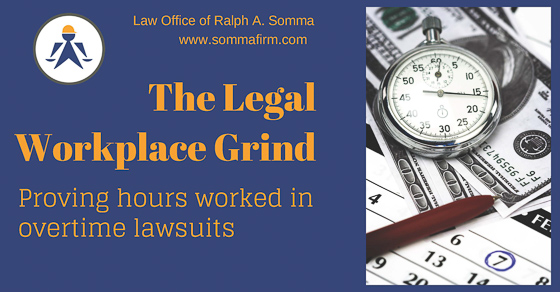An employee suing for unpaid wages or overtime has the burden to prove his case. For instance, an employee claiming he was not paid overtime wages must produce evidence showing he worked more than 40 hours a week and was not paid for all the overtime hours worked (at one and one-half times his regular hourly rate).
Employers Are Required to Keep Accurate Wage and Hour Records
Of course, most people don’t keep records of the hours they work or the wages they’re paid – they rely on their employer or its payroll service to carry out that function and assume they will be properly paid. That’s precisely the reason both federal and New York State law require employers to keep accurate records of hours worked and wages paid.
Where an employer doesn’t keep the records required by law, the employee’s burden of proof is lightened. In such a case, an employee can establish the number of weekly hours worked based simply on his own testimony or affidavit indicating his recollection of the estimated hours worked.
A recent case from the 6th Circuit Court of Appeals tells us that even where an employer keeps time records, an employee’s testimony alone can suffice to raise questions regarding the accuracy and/or authenticity of those records.
Falsified Time Records Can Be Challenged
Jeffrey Moran was employed as a mechanic at Auto Pro, an auto repair shop in Michigan. He sued his employer for unpaid overtime wages claiming he regularly worked 65-68 hours a week. According to Auto Pro’s time sheets, Jeffrey only worked 30 hours each week. The lower court dismissed his case. However, the appeals court reversed and found the timesheets did “not amount to objective incontrovertible evidence of Plaintiff’s hours worked”.
The court explained that the issue in this overtime case was whether an employee’s testimony alone is enough to defeat an employer’s motion for summary judgment dismissal. The appeals court found that it was and sent the case back to the district court because the employee’s testimony “coherently described his weekly work schedule, including typical daily start and end times which he used to estimate a standard work week of sixty-five to sixty-eight hours.”
While the court concluded that the employee’s testimony alone raised a sufficient dispute to warrant trial, it clearly took issue with the employer’s timesheets which the employee testified were false. Thus, the court noted that they were handwritten by the employer; were purportedly based on a practice of watching security footage to determine employees’ arrival and departure times; and, in all but five of ninety weeks, showed the employee worked exactly thirty hours, despite a fluctuating work schedule.
Time Shaving and Electronic Timekeeping
Although this case concerned questionable handwritten timesheets, the court’s conclusion can also apply to cases where electronic recording devices are used to capture employees’ time.
Many companies are now using devices such as electronic swipe cards, terminal entries, or machines which recognize the unique shape of the hand or a fingerprint to record employees’ work time. While these machines may accurately record an employee’s time entries, the initial data is only kept for a brief period of time by the device and uploaded to a computer for payroll processing purposes where it can be manipulated, edited or even deleted.
As a New York Times article noted, “Experts on compensation say that the illegal doctoring of hourly employees’ time records is far more prevalent than most Americans believe. The practice, commonly called shaving time, is easily done and hard to detect – a simple matter of computer keystrokes – and has spurred a growing number of lawsuits and settlements against a wide range of businesses.” Most recently, in December of 2014, a major McDonald’s franchisee settled a class action lawsuit alleging years of time shaving.
An employee who hasn’t been properly paid for all hours worked may believe she faces an uphill battle without time records to prove her claims. However, it’s important to know that it is the employer – not the employee – who has the obligation to keep an accurate record of employees’ time and wages.
Where the employer hasn’t maintained those records, an employee may prevail if she can offer testimony that will “present sufficient evidence for the jury to make a reasonable inference as to the number of hours worked.” And where the records that have been kept by the employer are not accurate, courts will consider evidence and testimony concerning the employer’s timekeeping practices as well as that concerning the employee’s work hours.
Please share your comments or questions below.
Ralph A. Somma is a Long Island, NY employment lawyer who handles cases involving unpaid wages and overtime.
Click Here to schedule a FREE telephone consultation.

About the Author: Ralph A. Somma
Ralph A. Somma is an experienced employment lawyer from Long Island, New York. For over 25 years, Ralph has been working to enforce workplace rights in New York and Long Island.
Call today (631) 587-1699 or click here to schedule a FREE telephone consultation.


Recent Comments